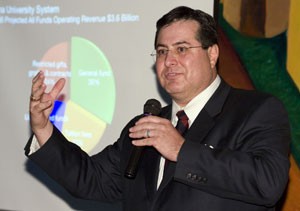As the state of the country’s education continues to fall behind other world leaders, Arizona’s educational institutions are feeling the brunt of the school slump, consistently placing close to worst in the nation in key educational data.
Such issues were addressed by Ernest Calderón, vice president of the Arizona Board of Regents, in an open meeting held last week by the UA, the board of regents and the Hispanic Professional Action Committee.
The meeting, part of HPAC’s monthly gathering, was a chance for Calderón to present to the public the goals of the Solutions Through Higher Education campaign initiated by the board in December. The campaign aims to increase public awareness of some of the current education challenges the state faces and the importance of investing in higher education.
HPAC is a non-profit, non-partisan, Tucson-based organization that seeks to enhance the well-being of and opportunities for Hispanics through advocacy and leadership development in the community.
Calling the situation “”a quiet crisis,”” Calderón said that innovation is the key to global competitiveness on the national and state levels, as Arizona rankings continue to fall for
education.
“”I think that a lot of our friends don’t know the crisis that we’re in, and HPAC is a very pro-education group … so that’s one reason why when they invited me to come, I came,”” Calderón said.
Calderón pointed to the fact that a low-income student of a high achievement level has a 77 percent chance of entering a university and succeeding, while a high-income student of a low achievement level has a 78 percent chance at success, as evidence that currently, “”It is better to be rich and dumb than to be poor and smart,”” he said.
The key to breaking the vicious cycle of low income leading to underdeveloped human capital is to improve the workforce through investment in education funding, Calderón said.
Arizona invests only $10 million for student financial aid, as compared to Colorado, which spends $55 million, or Washington, which spends $167 million. The trend is even higher for states like Indiana, “”the rust belt where people are fleeing in droves,”” where $281 million is spent on student financial aid, Calderón said.
Calderón said what Arizona needs is investment in all sectors, adding that Gov. Janet Napolitano has been very helpful through the P-20 council she created in 2006 to improve early education and align Arizona’s education systems with employer’s
expectations.
Calderón called for support of an Economic Stimulus Program, a $1.4 billion package that would invest state resources to revitalize the three state universities through construction. The program would also create 31,098 new jobs. If the package were passed, $477 million would go to improving the UA Medical School.
Some steps that are currently under way by the board of regents are
strategic planning to meet benchmarks in recruiting and retaining students while embracing community colleges, Calderón said.
The serious nature of the occasion was not lost on audience members, many of whom hold higher educational positions
in Arizona.
“”Americans take pride in being number one, and often times we are shocked to learn that we’re no longer the preeminent world leader in education; and it’s a tragedy, and it’s even more of a tragedy as our population becomes more diverse because we have to build on this population because they’re the future for tomorrow,”” said Juan Garcia, vice president for instruction and dean of University
College.
“”It’s important for all of us to understand that if the community is affected, that we’re all affected if we have a greater number of people who are not educated, who don’t have access to higher education,”” said HPAC President Sofia Ramos. “”So for all of us, it’s a counter-action then to increase access to higher (education) for everybody.””









